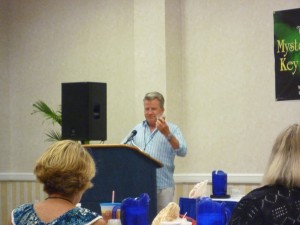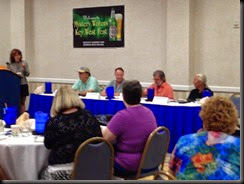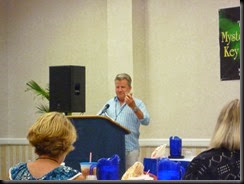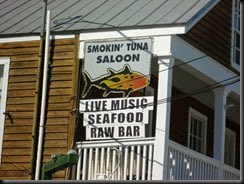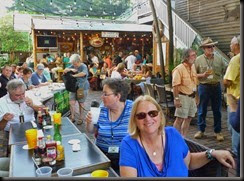Organizing a writers’ conference is a year-long, time consuming event. Having recently attended the inaugural Mystery Writers Key West Fest, I can appreciate the hard work put in by its co-organizers, Michael Haskins and Shirrel Rhoades, to make everything run smoothly. We’re doing the same thing for SleuthFest, scheduled for February 26, 2015. What steps do you have to take to organize a conference? This is by no means a comprehensive checklist, but here are some suggestions if your group is interested in moving forward with a big event.
Book the hotel and the date. This isn’t as easy as it sounds. You have to estimate the number of people attending, including speakers, editors, agents, and special guests. Why? Because you’ll need meeting rooms to fit your capacity. How many persons might attend each session? How many tracks per hour will you offer? Thus how many break-out rooms are required? Day by day and function by function, you’ll have to map things out with the hotel liaison. This includes social events like meals and cocktail parties. A contract is drawn up. What is the cost of each meal? How much in deposits are required and when? What’s the cancellation policy? If you’re in Florida, what happens if there is a hurricane warning that weekend? How many rooms of your block do you have to fill? You need a good negotiator for this aspect, and that’s only the start.
Obtain the keynote speakers. Once you have a date and place, you can put invites out for the key speakers. They’ll be a draw for everybody else and for press coverage.
Devise a conference budget. This will help you determine how much to charge for registration. Decide if your goal is to break even or to make a profit.
Appoint committee chairs. You’ll want to assign volunteers to take charge of the different roles, such as Programming, Editors/Agents, Author Liaison, Raffles, Publicity, Sponsors, etc. Put your key people in place early.
Brainstorm for programming ideas. What’s your conference theme? What topics do you want to cover? Will you have panels or one-on-one workshops?
Arrange for special events. Do you want to go on a shoot-out at a local range? Visit a morgue? Have a demonstration by K-9 dogs? Offer a murder mystery dinner cruise? Will you fill up the evenings, or will attendees be on their own?
Once you have laid the groundwork, you’re ready to solicit speakers and post your registration forms online. Assign a publicity person to be in charge of tweets, Facebook posts, and other online promotion. Another one can be in charge of obtaining sponsorships, like for tote bags and for maybe a coffee break. Don’t forget to solicit ads for the program book. Now you’re getting down to the nitty gritty details.
Be gracious and praise your team. Putting on a conference is an effort of love. We need to appreciate the volunteers who work so hard. Giving out token recognition awards or publicly recognizing your team mates at the event itself will go a long way toward getting those same volunteers to come back next year.
Even if your event seems to be a well-oiled machine, be prepared for last-minute snafus. Tell yourself that everything will work out fine. No one will notice the glitches, and they’ll all have a wonderful time.
If you wish to read my reports on conferences I’ve attended, visit my blog at Nancy’s Notes from Florida.
Have you been involved in conference planning? If so, what has been your biggest challenge?




